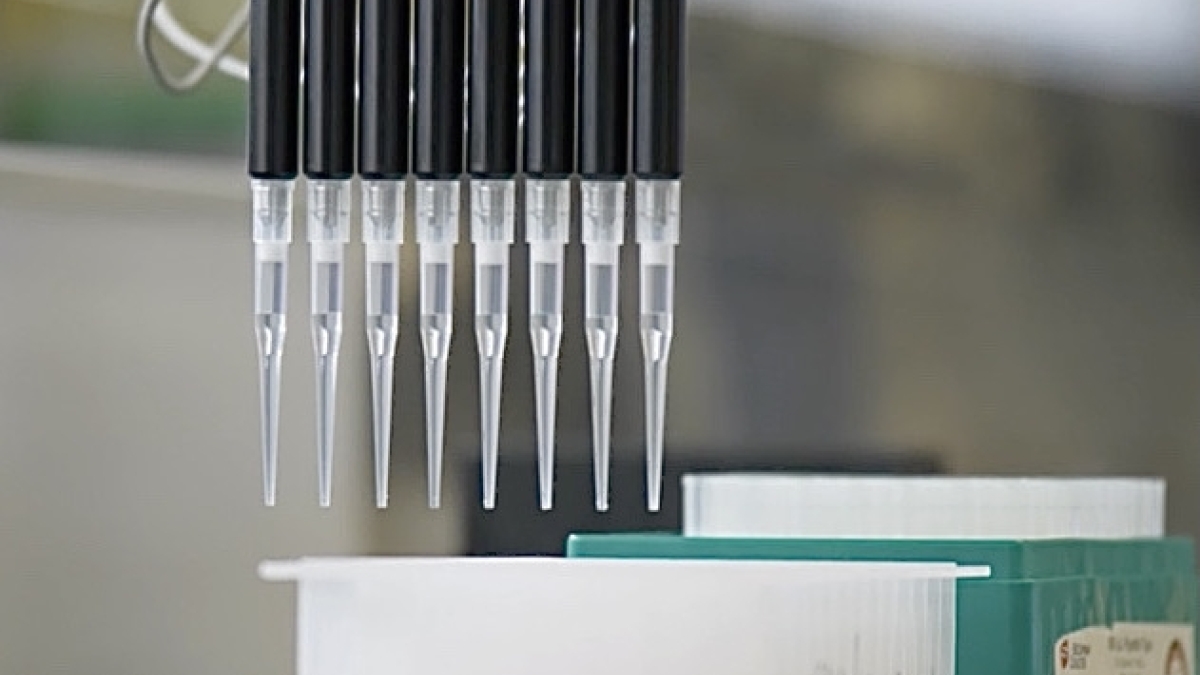Milestone: Arizona researchers sequence genomes of more than 100,000 COVID-19 samples

A massive effort to track the COVID-19 pandemic in Arizona over the past two years resulted in the genomic sequencing of more than 100,000 samples of the COVID-19 virus by a coalition of Arizona universities and health agencies, including Arizona State University, TGen, Northern Arizona University, the University of Arizona and the Arizona Department of Health Services.
This joint enterprise provides a proof-of-concept for building a 21st-century infectious-disease surveillance system to help prevent, detect, monitor and overcome the next pandemic.
As a result of this collaboration, Arizona is playing a major role in a growing nationwide and worldwide effort to use genomics to track infectious diseases, such as COVID-19.
As such, Arizona will be competing to be part of the Pathogen Genomics Centers of Excellence, a national network funded by the U.S. Centers for Disease Control and Prevention that would expand and deepen infectious disease collaborations between U.S. public health agencies and universities.
“Sequencing allows us to stay ahead of the SARS-CoV-2 virus as it evolves new variants, from the Alpha variant to Omicron and beyond,” said Efrem Lim, a researcher with ASU’s Biodesign Center for Fundamental and Applied Microbiomics and an assistant professor with the ASU School of Life Sciences.
“This real-time surveillance makes a difference for public health responses. As scientists, we have a responsibility to care for our communities,” said Lim, who helped accelerate rapid COVID-19 sequencing and oversaw a team at ASU that has now sequenced more than 40,000 of those genomes. “The statewide ACGUArizona COVID-19 Genomics Union team has worked together since the start of the pandemic. This has meant that Arizona has not been left in the dark. Arizona can count on us no matter what the future holds — in this pandemic, or the next.”
“It is only by sequencing samples of the COVID virus — using the power of genomic technologies — that scientists here in Arizona, and our colleagues around the world, have kept track of all the mutations and subsequent COVID variants during this pandemic,” said David Engelthaler, professor and director of TGen’s pathogen and microbiome division, the institute’s infectious disease branch in Flagstaff.
The pandemic’s weekly progression was documented on the Arizona COVID-19 Sequencing Dashboard compiled by TGen (the Translational Genomics Research Institute), part of City of Hope.
“When it comes to genomics, compiling 100,000 sequences is huge,” said Engelthaler, who supervised the collection and curation of Arizona’s COVID-19 genomes. “Never before has a feat like this been accomplished for an infectious pathogen, but it’s really only the beginning of how we can use next-generation science and technology, in real time, to make a real difference.”
Assistant Professor Efrem Lim accelerated rapid COVID-19 sequencing in his lab at the ASU Biodesign Institute and oversaw a team that has now sequenced more than 40,000 COVID-19 genomes. ASU is part of a statewide coalition called the Arizona COVID-19 Genomics Union, which is playing a major role in a growing worldwide effort to use genomics to track infectious diseases, such as COVID-19. Photo courtesy ASU Enterprise Marketing Hub
Arizona sequencing tracks the pandemic
Genomic sequencing is the spelling out of the DNA code — or in the case of a virus, the RNA code — that makes up an individual organism.
Human DNA is about 3 billion letters long, while the RNA of COVID-19 is about 20,000 letters long. The letters of code can change, or mutate, each time the organism replicates, which in the case of COVID-19 resulted in thousands of mutations and dozens of significant variants that changed the transmissibility and virulence of this pandemic.
“The 100,000 milestone represents a lot of hard work and coordination across all three state universities, TGen and ADHS,” said Paul Keim, a TGen Distinguished Professor, the executive director of Northern Arizona University's Pathogen and Microbiome Institute and one of the world’s leading authorities on infectious diseases.
“Arizona was not left behind in tracking the variants of SARS-CoV-2, the virus that causes COVID. As the global scientific community was identifying and tracking variants, Arizona was engaged and knew where we stood at all times,” Keim said. “With our surveillance data, we could learn from global efforts, make predictions for Arizona and respond to mitigate the pandemic as it arrived here.”
ACGU provides critical data about Arizona
At the start of the pandemic in early 2020, TGen and Arizona’s three publicly funded universities came together to form the Arizona COVID-19 Genomics Union, or ACGU, which is also the four chemical letters of RNA. Its expressed purpose is harnessing the power of state-of-the-art biotechnology and “big data” analysis to better understand how COVID-19 evolves, how it is transmitted and how and where it moves through the general population.
The ACGU is one of many scientific groups across the globe working to track COVID-19 through the rapid sharing of data and analysis, which has proved critical to the worldwide scientific, medical and public health understanding of the pandemic.
“The AGCU has really exceeded my expectations from when we founded it,” said Michael Worobey, head of the University of Arizona's Department of Ecology and Evolutionary Biology, who is world-renowned for his work on viral pandemics.
“We are among a small and elite group of U.S. states that have generated a full coronavirus genome sequence for about 1% of the total population,” Worobey said. “The future of preventing and controlling pandemics will hinge on the power of ‘genomic epidemiology.’ Our system, our teamwork — the depth of our bench — means that we will continue to lead the way in these important efforts.”
Arizona scientists accelerate technology
The Arizona COVID-19 Sequencing Dashboard was developed and maintained by TGen for Arizona, Arizona Department of Health Services and the CDC. Since its launch in February 2021, it has recorded more than 103,000 genomic sequences from Arizona COVID-19 patients. The site has recorded more than 217,000 visits.
“We have shown that we can apply these cutting-edge tools in a time of emergency and provide intelligence to health officials quickly and cost-effectively,” Engelthaler said. “Now is the time to parlay these successes into a more complete pathogen intelligence gathering system, and thankfully, Arizona has the innovation and collaborative spirit to do just that.”
Story written in conjunction with TGen.
More Science and technology

Applied Materials invests in ASU to advance technology for a brighter future
For nearly 60 years, global giant Applied Materials has been hard at work engineering technology that continues to change how microchips are made.Their products power everything from flat-panel…

Meet ASU engineering students who are improving health care, computing and more
Furthering knowledge of water resource management, increasing the efficiency of manufacturing point-of-care health diagnostic tools and exploring new uses for emerging computer memory are just some…

Turning up the light: Plants, semiconductors and fuel production
What can plants and semiconductors teach us about fuel production?ASU's Gary Moore hopes to find out.With the aim of learning how to create viable alternatives to fossil-based fuels, Moore — an…


